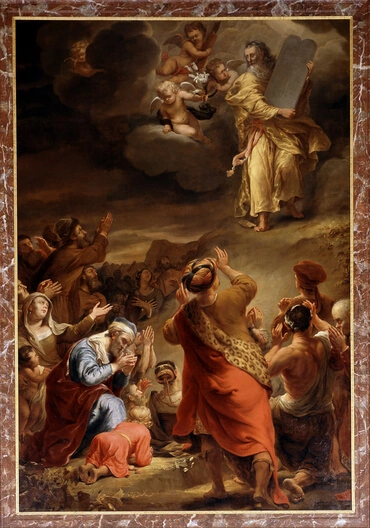1
Now the Lord came to him by the holy tree of Mamre, when he was seated in the doorway of his tent in the middle of the day;
2
And lifting up his eyes, he saw three men before him; and seeing them, he went quickly to them from the door of the tent, and went down on his face to the earth;
3
And said, My Lord, if now I have grace in your eyes, do not go away from your servant:
4
Let me get water for washing your feet, and take your rest under the tree:
5
And let me get a bit of bread to keep up your strength, and after that you may go on your way: for this is why you have come to your servant. And they said, Let it be so.
6
Then Abraham went quickly into the tent, and said to Sarah, Get three measures of meal straight away and make cakes.
7
And running to the herd, he took a young ox, soft and fat, and gave it to the servant and he quickly made it ready;
8
And he took butter and milk and the young ox which he had made ready and put it before them, waiting by them under the tree while they took food.
9
And they said to him, Where is Sarah your wife? And he said, She is in the tent.
10
And he said, I will certainly come back to you in the spring, and Sarah your wife will have a son. And his words came to the ears of Sarah who was at the back of the tent-door.
11
Now Abraham and Sarah were very old, and Sarah was past the time for giving birth.
12
And Sarah, laughing to herself, said, Now that I am used up am I still to have pleasure, my husband himself being old?
13
And the Lord said, Why was Sarah laughing and saying, Is it possible for me, being old, to give birth to a child?
14
Is there any wonder which the Lord is not able to do? At the time I said, in the spring, I will come back to you, and Sarah will have a child.
15
Then Sarah said, I was not laughing; for she was full of fear. And he said, No, but you were laughing.
16
And the men went on from there in the direction of Sodom; and Abraham went with them on their way.
17
And the Lord said, Am I to keep back from Abraham the knowledge of what I do;
18
Seeing that Abraham will certainly become a great and strong nation, and his name will be used by all the nations of the earth as a blessing?
19
For I have made him mine so that he may give orders to his children and those of his line after him, to keep the ways of the Lord, to do what is good and right: so that the Lord may do to Abraham as he has said.
20
And the Lord said, Because the outcry against Sodom and Gomorrah is very great, and their sin is very evil,
21
I will go down now, and see if their acts are as bad as they seem from the outcry which has come to me; and if they are not, I will see.
22
And the men, turning from that place, went on to Sodom: but Abraham was still waiting before the Lord.
23
And Abraham came near, and said, Will you let destruction come on the upright with the sinners?
24
If by chance there are fifty upright men in the town, will you give the place to destruction and not have mercy on it because of the fifty upright men?
25
Let such a thing be far from you, to put the upright to death with the sinner: will not the judge of all the earth do right?
26
And the Lord said, If there are fifty upright men in the town, I will have mercy on it because of them.
27
And Abraham answering said, Truly, I who am only dust, have undertaken to put my thoughts before the Lord:
28
If by chance there are five less than fifty upright men, will you give up all the town to destruction because of these five? And he said, I will not give it to destruction if there are forty-five.
29
And again he said to him, By chance there may be forty there. And he said, I will not do it if there are forty.
30
And he said, Let not the Lord be angry with me if I say, What if there are thirty there? And he said, I will not do it if there are thirty.
31
And he said, See now, I have undertaken to put my thoughts before the Lord: what if there are twenty there? And he said, I will have mercy because of the twenty.
32
And he said, O let not the Lord be angry and I will say only one word more: by chance there may be ten there. And he said, I will have mercy because of the ten.
33
And the Lord went on his way when his talk with Abraham was ended, and Abraham went back to his place.







